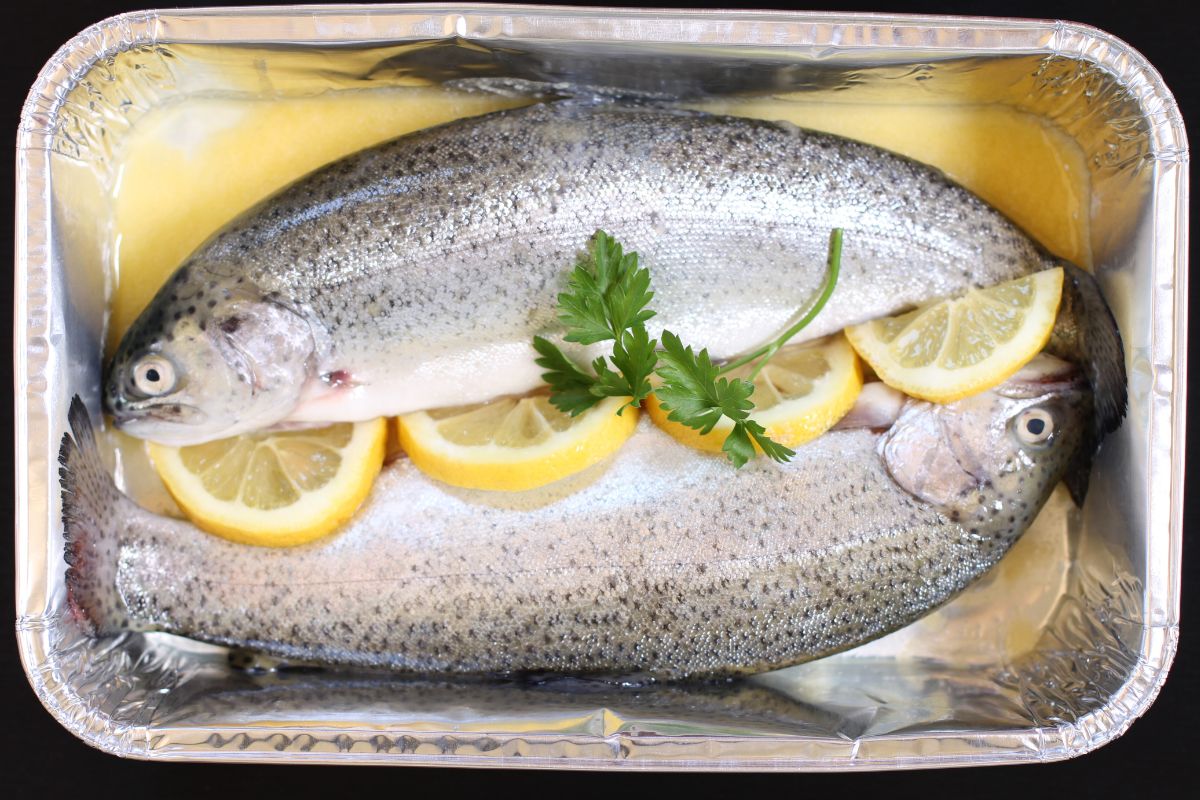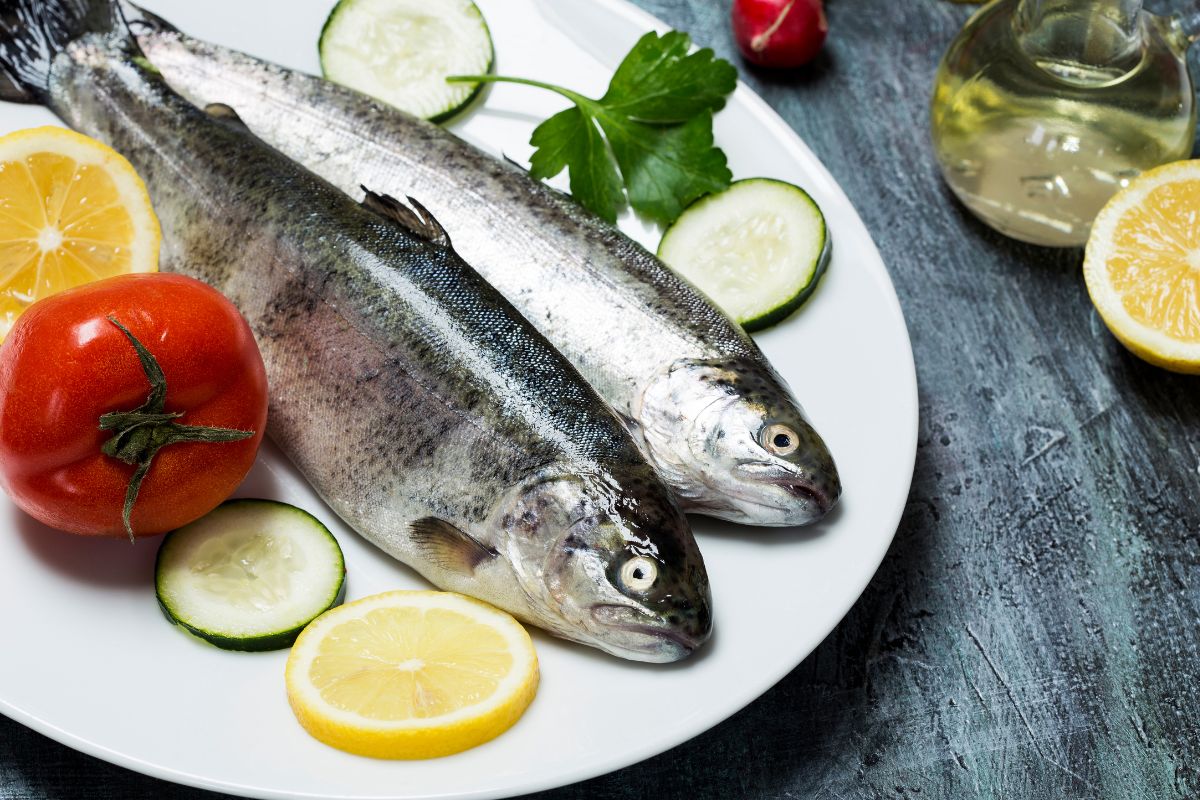What does trout taste like? Dive into its unique flavor profile, exploring variations by species, diet, and preparation. Stay tuned!

What is Trout?
Trout, belonging to the Salmonidae family and found throughout North America, Europe, and northern Asia, offers a distinct culinary experience. Both the trout taste and trout texture are influenced by the fish’s habitat and diet.
Some species adapt to sea life but return to freshwater to spawn. The trout’s taste is often described as sweet and nutty, while the trout’s texture is typically tender and flaky. Differences in size and oiliness further contribute to the diversity of the trout experience.
What Does Trout Taste Like?
(Using the “useful links” below, do an alphabetical writeup of the different trout types and their individual tastes)
Trout’s flavor varies based on its species. There are various species of trout with different appearances and taste profiles. More than a dozen recognized trout variations comprise multiple sizes, colors, and spot patterns.
Arctic Char
Flaunting a rich, mild, creamy flavor similar to salmon, serves as a versatile choice, excelling when smoked, grilled, or used in sushi.
Brook Trout
Often elusive in stores, Brook trout’s taste presents a delectable, almost sweet flavor without excessive greasiness. These smaller species grow up to 12 inches.
Brown Trout
Possessing a strong, fishy aroma and greasy texture requires a bit of culinary skill. Soaking the filets in milk overnight can balance their robust flavor.
Dolly Varden
Prevalent across various habitats, they are known for their flavor—a hybrid of salmon and trout, ranging from mild to deep red.
Golden Trout
Like their Brook counterparts, they are on the smaller side, growing up to 12 inches.
Lake Trout
The giants of the trout species, measuring up to around 24 inches, have a high-fat content that challenges their flavor profile. What does lake trout taste like? Often, it has a greasy feel and fishy smell, especially the white meat variety. However, those with orange meat are more palatable.
Rainbow Trout
The most commonly consumed species provide a mild, nut-like taste, similar to salmon, and a flaky white texture. Wondering what does rainbow trout taste like? Think of a milder, nuttier salmon readily available in most grocery stores.
Speckled Trout
So, what does speckled trout taste like? They offer a delicate, mild flavor that harmoniously pairs with sharper flavors and seasonings.
Steelhead Trout
Sharing taste similarities with salmon, it brings a medium flakiness to the table. If you’re curious about what does steelhead trout taste like, consider a more delicate, flaky version of salmon.
Sea Trout
Lastly, if you’ve ever asked what does sea trout taste like, the answer varies as “sea trout” is often a term used for different species of trout that spend time in the ocean.
In conclusion, the taste of trout meat, inherently bony, can vary based on diet, but its ability to absorb flavors and seasoning enhances its culinary value.
Is Trout Good to Eat?
Certainly, trout is not only good to eat but a treasure trove of rich, nuanced flavors. It’s popular among seafood enthusiasts for its sweet, nutty undertones. The lingering question ‘Is trout fishy?’ often arises.
While some trout species have a stronger, fishier flavor, many, like the Rainbow trout, offer a relatively mild, non-fishy taste. Additionally, trout is packed with essential nutrients like Omega-3 fatty acids, making it a hearty and healthy option to incorporate into your diet.
Does Trout Taste Like Salmon?
When asked, “How does trout taste?” the answer is layered. Trout and salmon, closely related and sharing similar lifestyles, often meet in the marketplace at comparable prices. However, how does trout taste in relation to salmon? While there are similarities, the taste of trout varies significantly based on its type and origin.
Trout, whether caught from lakes, harvested from saltwater, or farmed, each has a unique flavor profile. Among them, Rainbow trout is often the most accessible and known for its mild, slightly nutty taste. Its flavor can indeed draw parallels with salmon. Both fishes possess pink meat and a range of flavors that can delight the palate.
However, there’s a noticeable difference when you venture into freshwater trout territory.
Freshwater trout tend to lean towards a more bland, catfish-like flavor, distinct from the richer, more robust taste of salmon. This variation is just another testament to the rich diversity in the world of trout.
So, while trout and salmon share some similarities in taste, each stands on its own, providing a unique culinary adventure to those willing to explore their flavors.

Why do Trout Species Taste Different?
Wondering why trout species taste different? Several factors come into play. The best tasting trout often hail from wild rivers, where their diverse diets contribute to a rich flavor profile. In comparison, lake and farm trouts tend to have less intense flavors, sometimes considered less appealing.
It’s crucial for consumers to understand the origin of their trout to manage their culinary expectations, given the wide availability of trout in the market. How and where a trout lives can significantly impact its taste.
An interesting determinant is the fish’s activity. Increased movement and activity lead to changes in the fish’s muscle structure and higher oxygen-storing pigments. These physical changes directly influence the flavor, typically producing a more robust taste.
Moreover, the environment where trout live plays a part. Saltwater trout usually exhibit a more robust flavor due to the production of flavor-enhancing amino acids and chemicals like glycine and glutamate. Freshwater trout, on the other hand, are milder, lacking these flavor-enhancing chemicals.
While trout species may seem similar at first glance, differences in their lifestyle, habitat, and physical activity can lead to considerable variation in taste, bringing us the diverse palate that is the trout experience.
What is the Best Seasoning for Trout?
Determining the best seasoning for trout hinges on enhancing the trout flavor, not overpowering it. The trout taste is distinctive, mild yet nuanced, and its tender, flaky trout texture lends itself well to a variety of seasonings.
So, what does trout taste like when it’s perfectly seasoned? It’s a harmonious blend of its natural sweetness and the flavors of selected herbs and spices. Here are some top seasonings considered ideal for trout:
- Butter
- Dill
- Garlic
- Lemon
These seasonings help to accentuate the natural trout taste, making each bite a savory delight.
The Different Ways of Cooking Trout
Exploring the different ways of cooking trout opens up a realm of flavorful experiences. Each method brings out unique aspects of the trout’s taste, creating dishes catering to varied palates. So, how does trout taste when prepared in different ways?
- Pan-frying is a traditional method that brings out the trout’s natural flavors while creating a delightfully crispy exterior.
- Battering and deep-frying, while less common, transform the trout into a crunchy, indulgent treat.
- Grilling, another popular method, imbues the trout with smoky undertones.
- Baking, on the other hand, is a healthier option that allows the flavors to meld and deepen.
Certain trout species, such as Lake and Brown trout, are greasier, and marinating them in milk helps reduce this greasiness. This simple trick enhances the overall taste, making them contenders for the best tasting trout.
Yet, simplicity is key when cooking trout. To maintain the delicate brook trout taste, for example, it’s best not to overpower it with strong seasonings or complex methods.
And don’t limit trout to main dishes alone! Consider adding it to salads or pasta, making trout sandwiches, or transforming it into flavorful patties. Each cooking method introduces new ways to enjoy this versatile fish.
The Best Places to Buy Trout
Finding the best places to buy trout is crucial to ensure you’re getting high-quality, fresh fish that’s good to eat. The freshness of trout significantly influences its flavor. If it smells or tastes too fishy, it’s likely, not fresh and will not deliver the optimal taste experience.
Trout can be purchased from various sources, including online outlets, local fish marts, or trusted fishmongers. They can be bought as filets, trimmed, whole, or even frozen, depending on your preference and the dishes you plan to prepare.
Remember, is trout fishy? Not if it’s fresh. Perform a smell test to ensure freshness; a pungent fishy odor may indicate it’s nearing spoilage.
When considering does trout taste like salmon, the freshness and quality of your trout play a crucial role. Buying from authentic sellers and prioritizing wild-caught trout is recommended, as they are often nutrient-rich and offer superior flavor compared to farmed versions.
Lastly, understanding the origin of your trout is critical in managing your culinary expectations, given that trout is readily available in the market. Knowing its source can help you avoid bland dishes and ensure your trout cooking adventure is successful.

Final Musings
Wrapping up our deep dive into the world of trout, we’ve explored its multifaceted flavors and textures. What does rainbow trout taste like? Mild, slightly nut-like, it’s a perfect canvas for a plethora of seasonings.
The steelhead trout’s flavor, akin to salmon, offers a unique culinary delight. Sea trout, lake trout, and the delicately flavored speckled trout each provide their unique take on trout taste.
Is trout good to eat? Unquestionably!
This nutrient-rich fish is a versatile ingredient in many cuisines worldwide. But freshness is key; trout shouldn’t smell overly fishy. This is where the brook trout taste stands out with its delicate, almost sweet flavor.
Trout’s versatility shines in various cooking methods—pan-frying, deep-frying, grilling, and baking—each bringing out a unique facet of trout flavor. Complement these methods with the recommended seasonings like butter, lemon, dill, and garlic, and you have a delectable dish that tantalizes the palate.
But does trout taste like salmon? While there are similarities, the best tasting trout offers a flavor profile that stands on its own. Its origin—be it saltwater, freshwater, or farmed—dramatically affects the taste, with river trout offering the most flavorful experience.
So, whether you’re exploring the mild taste of rainbow trout or the rich flavor of steelhead, understanding these variations will enhance your culinary experience, ensuring each trout dish is a delightful journey.

Community of passionate writers and content creators who share a love for Italian heritage, culture, travel, food, and the Italian-American community. Our mission is to celebrate Italy’s rich history and traditions and connect with others who share the same passion.


